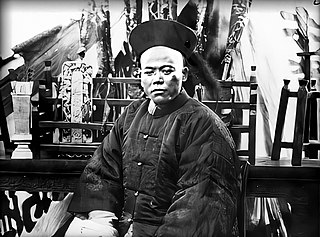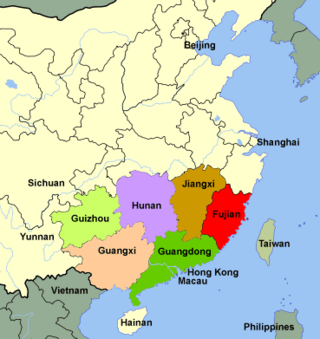This article needs additional citations for verification .(February 2024) |
| |||||
| Decades: | |||||
|---|---|---|---|---|---|
| See also: | Other events of 1863 History of China • Timeline • Years | ||||
Events from the year 1863 in China .
This article needs additional citations for verification .(February 2024) |
| |||||
| Decades: | |||||
|---|---|---|---|---|---|
| See also: | Other events of 1863 History of China • Timeline • Years | ||||
Events from the year 1863 in China .

Shi Dakai, born in Guigang, Guangxi, also known as Wing King or phonetically translated as Yi-Wang, was one of the most highly acclaimed leaders in the Taiping Rebellion and a poet.

Wei Changhui was the North King of the Taiping Heavenly Kingdom during the Taiping Rebellion.

The Viceroy of Liangjiang, fully named in Chinese as the Governor-General of the Two River Provinces and Other Local Admirals, in Charge of Military Affairs, Food and Wages, Management of Rivers, and Administration on Nanhe Affairs, was one of eight regional Viceroys during the Qing dynasty. The Viceroy of Liangjiang had jurisdiction of military, civil, and political affairs over then Jiangnan Province and then Jiangxi Province. The position was set up in 1647 and abolished in 1912.

Zeng Guoquan, courtesy name Yuanfu, art name Shuchun, was a Chinese official and military leader of the late Qing dynasty. He was the ninth brother of Zeng Guofan, a prominent statesman and general, and a descendant of the philosopher Zengzi. He served in the Xiang Army, a standing military force organised by his brother to counter the Taiping rebels, and was nicknamed "Ninth Marshal" (九帥). He was known for his expertise in siege warfare, particularly the use of trenches, hence he was also nicknamed "Zeng the Iron Container" (曾鐵桶). During the conquest of Tianjing (Nanjing), the capital of the Taiping Heavenly Kingdom, Zeng was notorious for condoning massacres of the city populace, which resulted in him being called "Zeng the Butcher" (曾屠戶).

Cheng Xueqi (Chinese: 程學啟; courtesy name Fangzhong 方忠; born in Tongcheng, Anhui, was a general of the Taiping Rebellion who surrendered to the Qing dynasty in 1861 with Ding Ruchang. He was an eminent Han Chinese official and a Captain General in the army of the late Qing dynasty. He led the Huai Army to fight effectively against the Taiping rebels and helped to restore the stability of Qing, along with other prominent figures, including Li Hongzhang and Zeng Guofan, setting the scene for the successful defense of Shanghai and the Suzhou Massacre POW Incident. The Tongzhi Emperor praised Cheng as "intelligent and brave".
Jiangnan Daying or the Jiangnan Battalion; was an army group assembled by the Qing dynasty. The army group consist of mostly Green Standard Army, and their goal was to quell the Taiping Rebellion around the Jiangnan region. The army group twice encircled Nanjing, the capital of the Taiping Heavenly Kingdom, but were defeated by the Taiping forces on both occasions.
Qin Rigang, né Qin Richang (秦日昌), was a Hakka military leader of the Taiping Rebellion, known during his military tenure as the King of Yen (燕王). He served under Hong Xiuquan's Taiping Administration and led Taiping forces to many military victories. He was executed by Hong Xiuquan in 1856 because he had killed the family and followers of Shi Dakai during the Tianjing Incident. Chen Yucheng and Li Xiucheng were trained and taught by Qin.

The Tianjing Incident was a major internal political conflict within the Taiping Heavenly Kingdom occurring during the late Qing dynasty from September 2 to October 1856. The conflict itself took place in the Taiping's capital city Tianjing. A few key leaders of the Taiping Rebellion were killed: the East King Yang Xiuqing, the North King Wei Changhui and the Yan King Qin Rigang. More than 27,000 other opposition rivals including soldiers perished in the conflict as well. The Tianjing Incident was said to be one of the factors which led to the eventual failure of the Taiping Rebellion, as well as the turning point in its fate.
Tang Zhengcai was an eminent navy leader of the Taiping Rebellion, known during his tenure as the King of Hang (航王). He led the Taiping fleet in many battles, nearly destroying the Xiang Army. He trained other naval officers, including Li Rongfa and Li Xiucheng. Tang was killed in action in 1863.

The Taiping Heavenly Kingdom is a Chinese television series based on the events of the Taiping Rebellion and the rise and fall of the Taiping Heavenly Kingdom in the late Qing dynasty. The 48-episode series was first broadcast on CCTV in China in 2000. The series was also broadcast on STAR Chinese Channel in Taiwan and on ATV in Hong Kong.

The Red Turban Rebellion of 1854–1856 was a rebellion by members of the Tiandihui in the Guangdong province of South China.
Events from the year 1872 in China.
Events from the year 1860 in China.
Events from the year 1861 in China.
The Western Expedition was a campaign by the Taiping Heavenly Kingdom against the Qing dynasty during the Taiping Rebellion.
Events from the year 1857 in China.
Events from the year 1862 in China.
Events from the year 1864 in China.
Events from the year 1865 in China.
Events from the year 1878 in China.